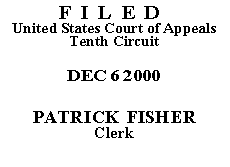

| ROBERT G. LILE,
Petitioner-Appellant, v. DAVID R. MCKUNE, Warden; ATTORNEY GENERAL FOR THE STATE OF KANSAS, Respondents-Appellees. |
|
Petitioner Robert G. Lile appeals the district court's denial of his petition for writ of habeas corpus brought under 28 U.S.C. § 2254. We dismiss the appeal for substantially the reasons stated by the district court.
A Kansas jury convicted Mr. Lile of rape, aggravated sodomy, and aggravated kidnaping. His convictions were upheld on direct appeal, see State v. Lile, 699 P.2d 456, 459 (Kan. 1985), and post-conviction relief was ultimately denied. Mr. Lile then filed a § 2254 petition in federal court which was rejected on the merits. In April of this year, Mr. Lile filed a notice of appeal from the denial of his habeas petition. Because Mr. Lile's notice of appeal was filed after the effective date of the Antiterrorism and Effective Death Penalty Act (AEDPA), the provisions of that Act apply to this appellate proceeding, and this court will treat Mr. Lile's notice of appeal as an application for a certificate of appealability (COA). See Slack v. McDaniel, 120 S. Ct. 1595, 1602 (2000).
The statute governing the issuance of a COA "establishes procedural rules and requires a threshold inquiry into whether the circuit court may entertain an appeal." Id. at 1603. No COA will be forthcoming unless "'the applicant has made a substantial showing of the denial of a constitutional right.'" Id. (quoting 28 U.S.C. § 2253(c)). Where, as here, the district court rejected Mr. Lile's constitutional claims on the merits, Mr. Lile must now "demonstrate that reasonable jurists would find the district court's assessment of the constitutional claims debatable or wrong." Id. at 1604.
In the district court, Mr. Lile made essentially the same arguments he makes here:(1) (1) there was insufficient evidence to support his convictions; (2) the state destroyed exculpatory evidence in bad faith; (3) the submission of partially hand-written and highlighted jury instructions denied him due process; and (4) ineffective assistance of counsel.
As noted above, the district court rejected Mr. Lile's claims on the merits. Finding that the victim's testimony at trial was not inherently incredible, the district court refused to disturb the state jury's evaluation of witness credibility and held that sufficient evidence supported Mr. Lile's convictions. In analyzing the ineffective assistance of counsel claim, the district court held Mr. Lile failed to show that the State acted in bad faith in destroying allegedly exculpatory evidence, thus defeating his contention that counsel's failure to move for a dismissal on that basis constituted ineffective assistance.
We have reviewed Mr. Lile's brief and the record in this case,(2) and find no basis upon which to conclude that reasonable jurists would find the district court's assessment of the constitutional claims it addressed to be either debatable or erroneous.
With regard to Mr. Lile's contention that he was denied due process because of certain marks and highlighting on the jury instructions, we note that there is no evidence that either the trial judge or the prosecution was responsible for these marks. Indeed, it is entirely possible that one of the jurors made the marks complained of. Taken as a whole, the instructions fairly presented the charge and the applicable law. United States v. Beers, 189 F.3d 1297, 1301 (10th Cir. 1999), cert. denied, 120 S. Ct. 1696 (2000). Ultimately, Mr. Lile has not shown that the presence of these marks on the jury instructions deprived him of any constitutional right.
Because Mr. Lile has failed to show that reasonable jurists would find the district court's assessment of his constitutional claims to be debatable or wrong, and because his jury instruction claim does not implicate a constitutional violation, we DENY the application for a certificate of appealability and DISMISS this appeal.
Entered for the Court
Circuit Judge
*. This order and judgment is not binding precedent, except under the doctrines of law of the case, res judicata, and collateral estoppel. The court generally disfavors the citation of orders and judgments; nevertheless, an order and judgment may be cited under the terms and conditions of 10th Cir. R. 36.3.
1. Although Mr. Lile presented his jury instruction argument to the district court, the court did not address that claim. The court did, however, address Mr. Lile's claim regarding his post-conviction proceedings, a claim he does not press on appeal.
2. The full trial transcript was apparently not before the district court. We grant petitioner's motion to supplement the record on appeal and have considered all of the transcripts presented by petitioner. See United States v. Kennedy, 225 F.3d 1187, 1192 (10th Cir. 2000) (noting court's inherent equitable power to supplement the appellate record).